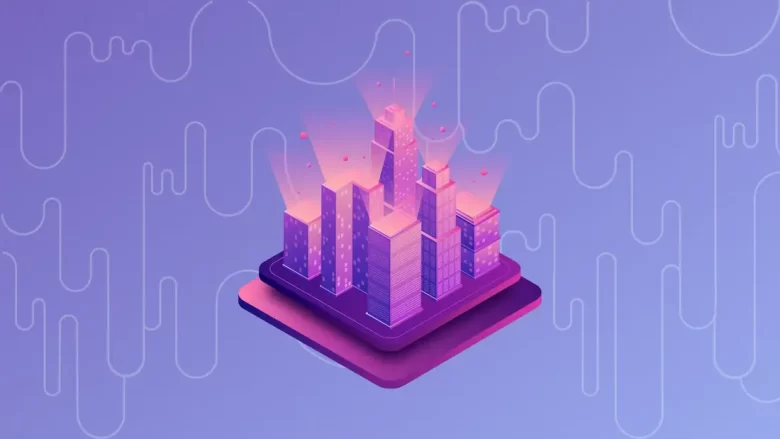The idea of virtual real estate in the metaverse has attracted a lot of attention recently, with many investing large sums of money to purchase digital plots. As virtual worlds gain popularity, the notion of owning land in them appears to be increasingly appealing. Similar to real property in the real world, virtual land is a digital asset that is available for purchase, sale, and subsequent development. The question is, should you invest in real estate in the virtual world? To answer this question, we must first understand virtual land and its role in online spaces.
Understanding Virtual Land and the Metaverse:
The virtual land can be described as a piece of digital property on a metaverse platform like Decentraland, The Sandbox, or Somnium Space, where users can create, design, and interact. Like physical land, it can be considered a limited resource on these platforms. Metaverse is a digital world made up of interconnected virtual universes in which people can socialize and work, shop, and participate in a variety of different activities. Virtual land in these environments can be used to build retail stores, art galleries, entertainment venues, and many other digital assets. Ultimately, people view owning virtual property as an investment opportunity, akin to investing in real estate in the physical world.
Factors Affecting the Value of Virtual Land:
Various factors affect the value that virtual land can bring to the world. A major factor is the number of users and the popularity of the platform on which the land is. As the number of developers and users on the platform increases, so does the demand for virtualized land. Similarly, the type of virtual world and its usage scenarios play a significant role in determining land value. A metaverse that is focused on entertainment, gaming, and social interactions could be more popular for virtual land as people seek ways to connect and participate in these activities. Conversely, virtual land situated on more restricted platforms may experience lower usage, potentially limiting its value.
Another reason is the limited supply of land on the platform. If a metaverse is unable to supply land, this could increase the price of the house. For instance, in games such as Decentraland and The Sandbox, land parcels are not infinite, which can result in an environment of competition among buyers and increase their value as time passes. Furthermore, both current development and the potential for future land development are important. Land located close to the most popular virtual locations, such as shopping centers, entertainment centers, entertainment hubs, or major attractions, is likely to be of more value than land located in less frequently visited areas of the metaverse.
How Virtual Land is Purchased and Managed:
The process of purchasing virtual land usually involves the use of cryptocurrency, which is the primary payment method used by the majority of metaverse platforms. Platforms such as Decentraland as well as The Sandbox operate on blockchain technology. Transactions are carried out using cryptocurrency like Ether as well as MANA (the currency that is used by Decentraland). After purchase, virtual land is kept in a digital wallet, and ownership is registered on the blockchain, thereby providing an unsecured and clear proof of who owns the land. Virtual landowners can manage and enhance their properties by creating virtual experiences, hosting activities, or leasing the land to others. The capability to develop and design with virtual property is an important distinction from other kinds of digital assets, since it offers various possibilities to monetize and engage.
The Social and Cultural Value of Virtual Land:
Apart from its potential for financial gain, virtual real estate in the metaverse may also have cultural and social worth. As the metaverse becomes a more integral part of everyday life, virtual space could be a place for artistic creativity, community building, and cultural exchange. For instance, musicians and artists can utilize virtual spaces to showcase their work, while influencers and brands can create virtual storefronts and environments for their followers. These venues provide a platform for people to meet to socialize, network, and interact with each other in ways that go beyond the conventional internet. The social aspects of having a virtual property should not be ignored, as it could become a major element of the communities online that form in metaverse websites.
The Role of Virtual Land in Business and Marketing:
For companies, buying virtual space in the metaverse offers an unbeatable opportunity for marketing and branding. Companies are constantly looking for new ways of engaging with their customers; having a virtual land in the metaverse can enable them to create immersive brand experiences, such as virtual storefronts and interactive advertisements. Virtual land provides businesses with the opportunity to connect with new generations of customers who are already interacting with the world of technology innovatively. Shortly, we could see complete online shopping galleries, malls, or corporate centers operating in the metaverse, forming a brand new business environment and commerce.
Should You Buy Virtual Land?
The decision to purchase virtual land in the metaverse relies on many aspects, such as your objectives as well as your risk tolerance, and your interest in the metaverse in general. Virtual land may be a good investment, but take your time. The market for metaverses is extremely speculative, and the value of virtual land could change rapidly. Anyone who decides to make investments in the virtual world must do so with a clear awareness of the risks involved and the potential for gain and loss. To make informed investment choices, you must stay current on technological advances and trends in metaphysics.
For those attracted to the cultural and social elements of metaspace, buying virtual land could be an opportunity for creative expression as well as being a part of the expanding digital world. If you’re looking to establish a presence in the world of metaphysics, whether as an entrepreneur, artist, or community-building expert, having a virtual space could provide you with possibilities for growth and engagement. In the end, purchasing virtual land is an option that is in line with your personal or business objectives and should be considered with care.
Conclusion:
The idea of buying virtual territory that is in the universe of dreams is a thrilling and novel idea that presents possibilities for investment as well as business. But, like any new market, there are risk factors to consider. The value of virtualized land is determined by various factors, including how popular the site is, its scarcity, and the potential for development. While virtual land may provide economic benefits, it is prone to changing market prices and uncertain prospects. It’s crucial to do extensive research and determine your risk tolerance before deciding to buy virtual land. The early adopters may be better positioned to benefit from the opportunities presented by the expanding field of metaphysics.
FAQs:
1. Is purchasing virtual real estate in the metaverse an investment worth it?
A virtual land purchase can be an investment that is worthwhile, but it is not without risk. The value of virtualized land is determined by the popularity of platforms, the scarcity of land, and the potential for development. While some individuals have made a profit, the metaverse is still developing, making it important to carefully evaluate the associated risks.
2. What potential does virtual space within metaspace hold?
The virtual land could be made into virtual shops, experience galleries, exhibitions, or event areas. It is possible to rent and sell the space, develop interactive experiences, and utilize it to promote businesses and brands.
3. Do I require cryptocurrency to purchase the virtual property?
Yes, the majority of metaverse platforms need cryptocurrency for transactions. Common currency options include Ethereum (ETH), MANA, and other tokens for platforms.
4. How do I manage virtual land after purchasing it?
You manage your virtual land using a digital wallet. You are able to access and manage your property. It is possible to develop the land, rent it, or even sell it based on a specific platform.
5. Does virtual land represent a stable investment?
Virtual land investment is highly speculative and could change in price. The market is still developing, and the future PR for particular metaverse platforms remains uncertain. It is important to consider the risks of investing before deciding to do so.




